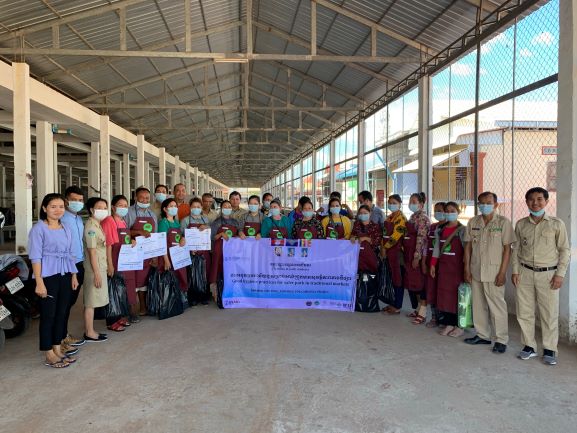Action movies often dramatize how a team comes together to stand for justice, but this story line may seem strange in the world of agricultural research. Even so, a research team in Cambodia pursued a unique and ambitious approach to achieve its vision of safe food both during the project and beyond by establishing the Food Safety Taskforce.
“It sounds a little bit military, but we wanted to do something fast and efficient,” said Hung Nguyen-Viet, a researcher from the International Livestock Research Institute (ILRI) who helped implement the project for his colleague and the project’s principal investigator, Delia Grace.
The taskforce was formed near the beginning of the project Safe Food, Fair Food for Cambodia, which was implemented from 2017 to 2021, as a means to engage key partners in the country’s challenging domain of food safety. It was a strategic choice based on the Cambodian context and the project’s intention to use its findings to support new policies.
Developing the Food Safety Sector
In 2010, Cambodia established regulations and responsibilities for food safety across six agencies, and it created a national technical food safety working group. Representatives from this group and the six agencies were invited to join the new taskforce along with others from universities, research centers, and international organizations such as FAO. In December 2017 and January 2018, exploratory meetings of the taskforce reviewed safety problems relevant to the project and introduced quantitative risk assessment of foodborne pathogens using the project’s data. At the end of October 2019, 25 experts gathered to solidify the taskforce and its goals.
By the end of the project in June 2021, the Food Safety Taskforce had earned pledges from ILRI to support scaling up activities through the National Animal Health and Production Research Institute (NAHPRI). The project characterized the taskforce as a bridge to translate its food safety research evidence into policy and practices.
Life and Death Issues
Although the process of forming a committee may not pique the cinematic interest of Hollywood, its subject matter involves life and death issues with the twist of misinformation.
“We have a saying that what you worry about, and what makes you sick and kills you, are not the same,” said Delia Grace at the project’s closing workshop, held online June 21 to 22, 2021.
She explained that Cambodian women express high concern about chemicals polluting their food, but research shows that illness from Salmonella contamination is a greater, more immediate risk.
To coordinate how to present such findings in an effective manner, the taskforce met on February 18, 2021 to discuss and disseminate key project findings. It continued integration efforts with the national technical food safety working group, and it planned for scaling up of the project’s policy recommendations and light-touch interventions in traditional markets.
Overall, this project was highly participatory and iterative. It evolved based on stakeholder input, and it fostered South-to-South support through relationships with Vietnam. Even with the arrival of COVID-19, it maintained momentum, creating a food safety training video and handbook for wet market retailers and publishing five journal articles.
The Safe Food, Fair Food for Cambodia project was implemented by ILRI in partnership with NAHPRI, the Livestock Development for Community Livelihood Organization, the Department of Communicable Disease Control in the Cambodian Ministry of Health, and the National Institute of Public Health.

 2
2
